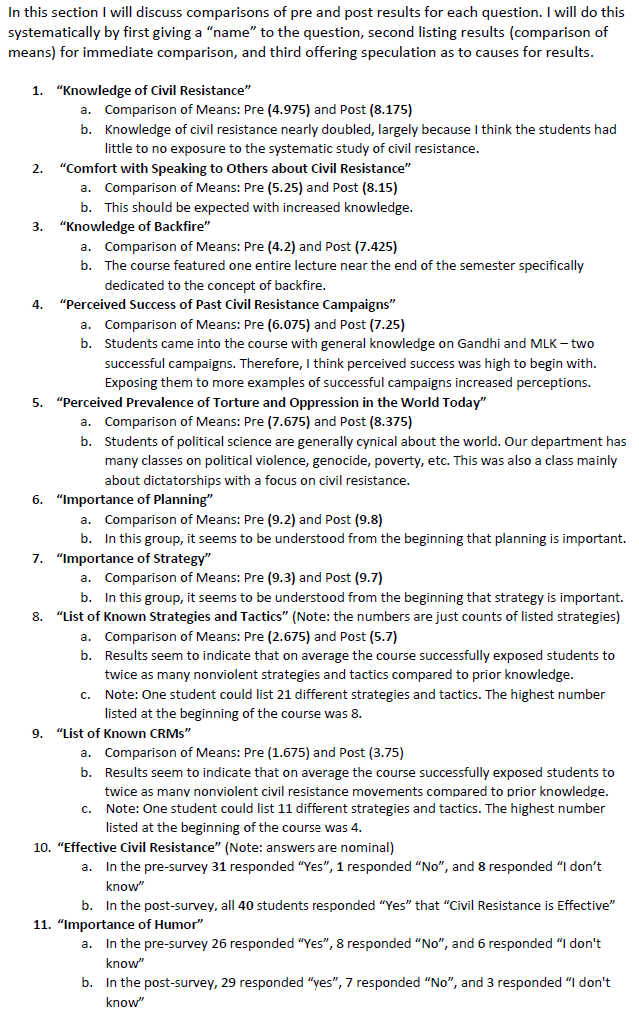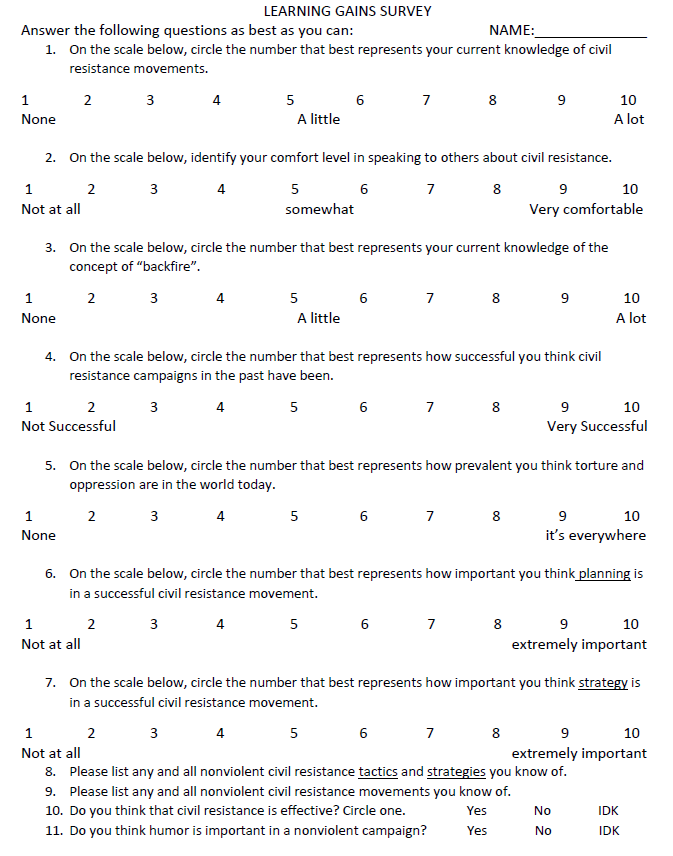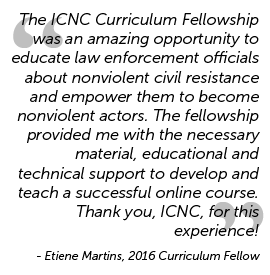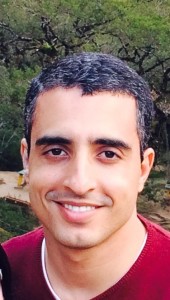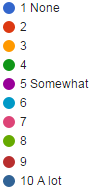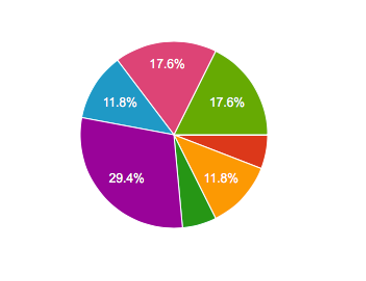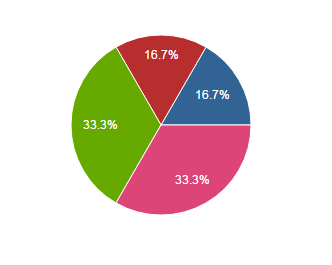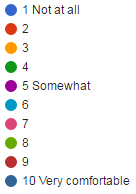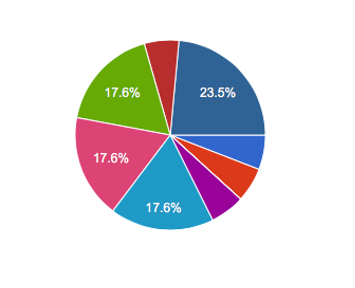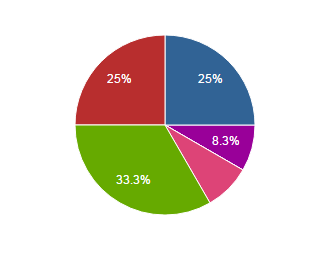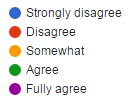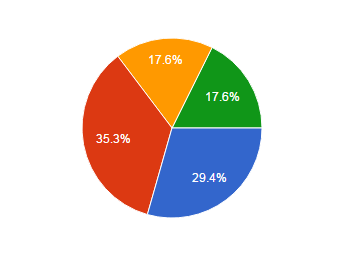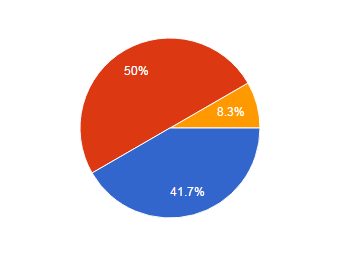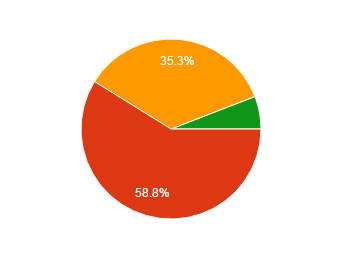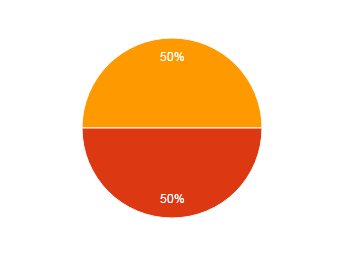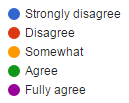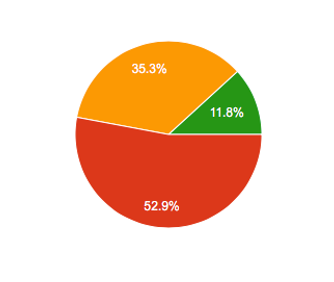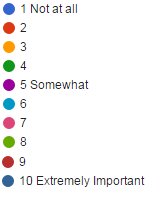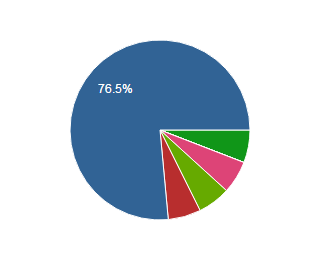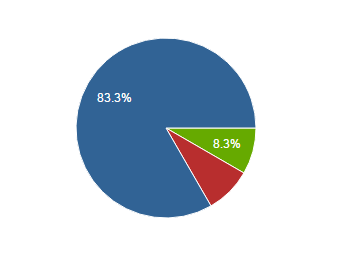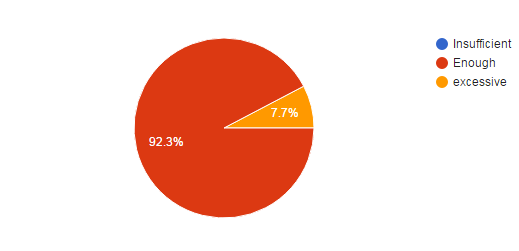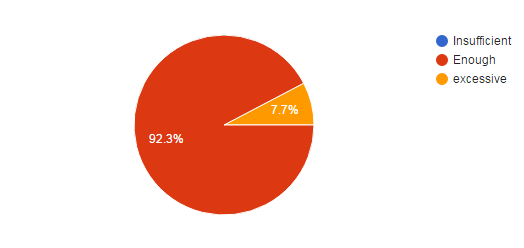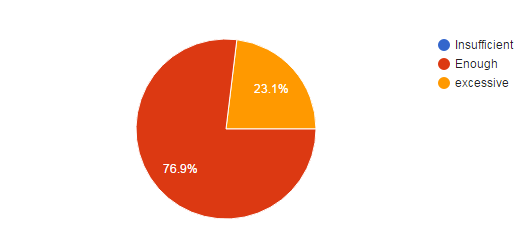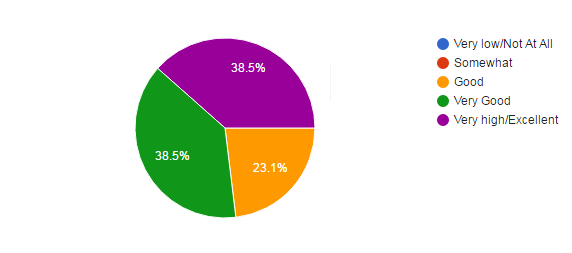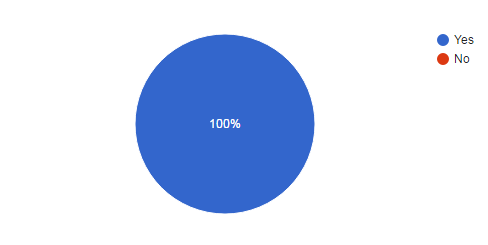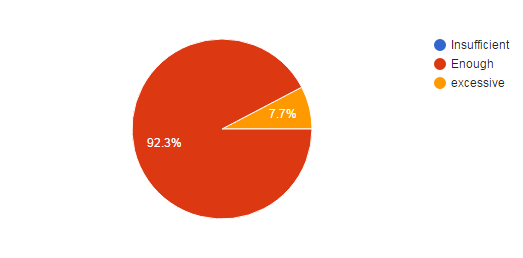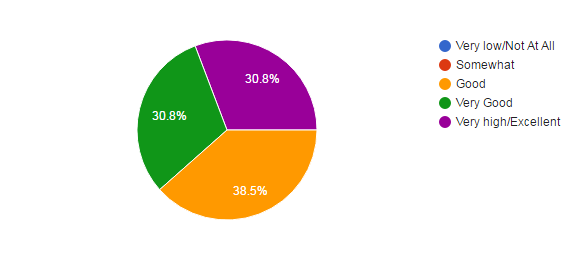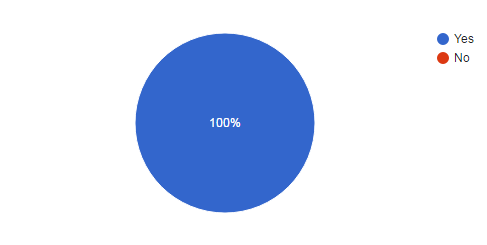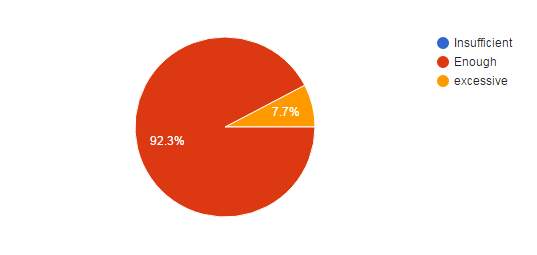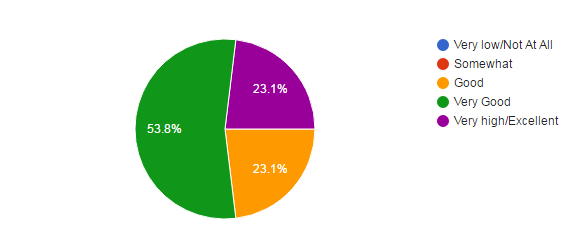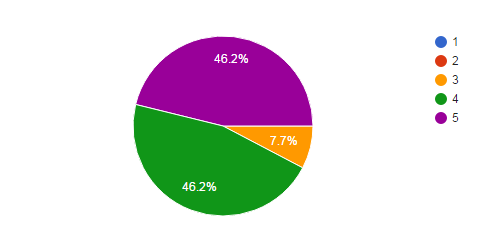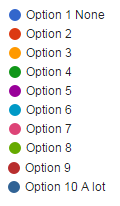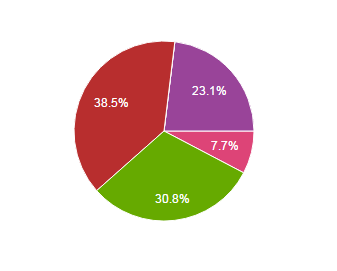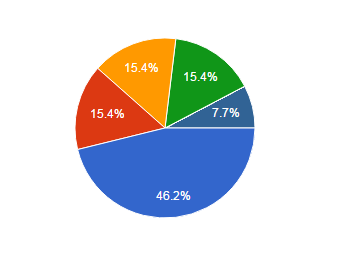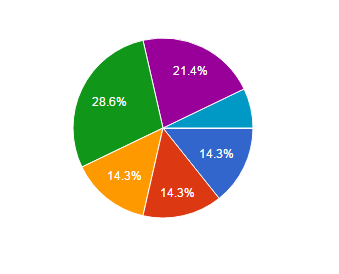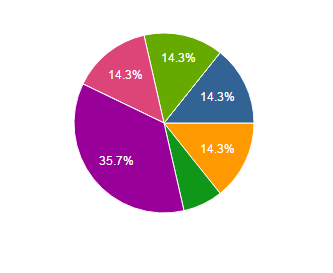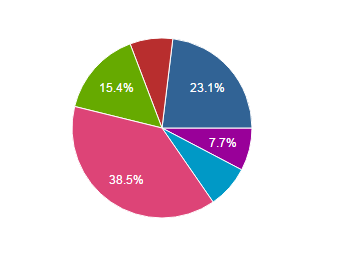 Clay Fuller, the ICNC Curriculum Fellow, developed, offered and moderated a classroom-based course on civil resistance in Fall 2016 at the University of South Carolina as part of the ICNC Curriculum Fellowship. The course was conducted at the University of South Carolina, Columbia, South Carolina.
Clay Fuller, the ICNC Curriculum Fellow, developed, offered and moderated a classroom-based course on civil resistance in Fall 2016 at the University of South Carolina as part of the ICNC Curriculum Fellowship. The course was conducted at the University of South Carolina, Columbia, South Carolina.
The information featured below was submitted as part of the fellowship requirement for classroom-based course that, among others, required a detailed course proposal with clearly developed sections on civil resistance, assigned readings, assignments relevant to the subject matter and evaluation tools.
Learn more by clicking on the topic links:
- About the Curriculum Fellow
- Course Abstract
- Course Structure
- Assignments
- Course Evaluation
- Learning Gains Survey Results
Section I: Summary Statistics
Section II: Discussion of the Survey Results
Section III: Discussion of the Question-Specific Results
Section IV: Survey Template
Section IV: Granular Data
Go back to the main ICNC Curriculum Fellowship page.
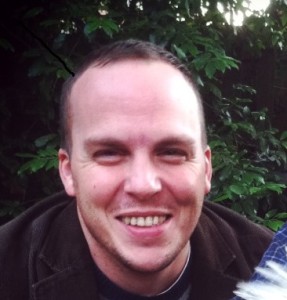 Clay Fuller is a research assistant for the Walker Institute of International and Area Studies, a sixth year PhD candidate (ABD) and adjunct instructor at the University of South Carolina, and he also teaches international relations online for Western Carolina University (NC). Clay studies non-democratic political institutions and the conditions under which these allow for liberal economic experimentation.The title of his dissertation is ‘Authoritarian Liberalism: Dictatorship in the 21st Century.’ His dissertation proposes an alternative assumption to the largely held belief that authoritarian regimes that grow the domestic economy and adopt semi-democratic political institutions will eventually lose control of the process and democratize. Essentially, modern authoritarian regimes are quite capable of adopting most of the necessary conditions for democracy while successfully avoiding the sufficient. His first field is comparative politics and second is international relations. Clay’s research resides in the nexus of these two fields and offers promising new data and insight concerning the use of special economic zones (SEZs) and sovereign wealth funds (SWFs). He regularly teaches an original topics course on modern dictatorships (to which this fellowship is applied) and regularly teaches basic international relations theory courses.
Clay Fuller is a research assistant for the Walker Institute of International and Area Studies, a sixth year PhD candidate (ABD) and adjunct instructor at the University of South Carolina, and he also teaches international relations online for Western Carolina University (NC). Clay studies non-democratic political institutions and the conditions under which these allow for liberal economic experimentation.The title of his dissertation is ‘Authoritarian Liberalism: Dictatorship in the 21st Century.’ His dissertation proposes an alternative assumption to the largely held belief that authoritarian regimes that grow the domestic economy and adopt semi-democratic political institutions will eventually lose control of the process and democratize. Essentially, modern authoritarian regimes are quite capable of adopting most of the necessary conditions for democracy while successfully avoiding the sufficient. His first field is comparative politics and second is international relations. Clay’s research resides in the nexus of these two fields and offers promising new data and insight concerning the use of special economic zones (SEZs) and sovereign wealth funds (SWFs). He regularly teaches an original topics course on modern dictatorships (to which this fellowship is applied) and regularly teaches basic international relations theory courses.
This political science course combines the traditionally domestic and/or area focus of comparative politics with the global and/or interstate levels of analysis associated with international relations. Authoritarianism, neo-authoritarianism, soft authoritarianism, dictatorship, monarchy, autocracy, totalitarianism, single-party regimes, military juntas, and the all-encompassing ‘non-democracy’ are merely a few of the many names given to world’s oldest and most common form of government. Despite ‘waves of democratization,’ in 2015 Freedom House reported that 55% of the world’s countries and 60% of the world’s population are not fully “free.” They also currently report a steady decline in freedom around the world for the entire past decade (freedom measured by civil liberties and political rights). This class explains and explores what these data and terminology mean, the methodologies used to generate these stats, and the major theoretical explanations for the continued survival of non-democracies and their leaders. In addition to learning the various theories concerning non-democratic survival, there are three other components to the course: 1) a section on data collection in dictatorships, 2) a semester-long computer simulation of the fall of a dictatorship to a civil resistance campaign, and 3) a large segment on civil resistance including its history, strategies, and tactics. It is actually not very difficult to remove a dictator from office relative to the difficulty of building a democratic society. The aim of this course is not only to educate students about the 80+ non-democratic regimes that exist today, but also to inspire students to learn more about the front end of the democratization process (removal of the dictator or regime) while simultaneously warning them about the pitfalls that face the group that replaces the regime.
The civil resistance units in this course were presented over the last three weeks of the semester. We followed the approved syllabus in the execution of the class, especially in regards to the civil resistance modules. Class goals were met through lecture, discussion, videos, on-line discussion, writing assignments, and a guest speaker. Evaluation was done based upon evidence of reading and participation.Before beginning the section on civil resistance, we did an in-class simulation of the fall of a dictatorship. It is a role-playing strategy game developed by a professor in Boston. It explores strategies between the ruling coalition and the people in a fictional dictatorship (like the People Power game, but this is in-class and in-person). The in-class simulation does not incorporate civil resistance tactics; however, it makes a great transition into the civil resistance section of the class because it exposes the dynamics that make a dictator susceptible to removal and fires up the imaginations of the students. The students always enjoy and have fun with this simulation. In future iterations, I plan to do the simulation a second time, incorporating nonviolent strategies in the player profiles.
The main assignments was a paper that each student wrote either 1) explaining and analyzing a historical nonviolent resistance movement using the assigned readings or 2) identifying a current situation where a nonviolent resistance movement could be effective and evaluating the prospects of such a plan (using the assigned readings). One extra assignment was added to encourage further reading. Students were offered extra points to create a “tweet” and a “hashtag” for specific readings and then write a paragraph explaining what message the tweet was intended to convey. The students enjoyed this exercise and in future iterations I will be using it again in a more systematic way.
In sum, I think the students enjoyed and learned a lot from the civil resistance modules. I learned a lot as well. My experience with this bled into a related class that I taught this fall – Political Violence and Revolutions. In it, I gave my students the options to design a nonviolent resistance movement in the United States to fix the student loan problem. I first established with every student that there was a problem. I asked them to share their experiences and thoughts. They mostly expressed apathy or helplessness. Some even expressed resentment for people who complain about it (even though they also recognized it was a big problem). I then simply asked “what are you going to do about it?” Most said “nothing.” I then asked them what would happen if all 50 million+ students and the millions more paying off student loans simply refused to make any more payments. I could tell that many had never even considered this. They became excited. Many tried to rationalize by saying that it would ruin their credit rating. I countered by asking them how that logic works.Many were struck by the concept of power through consent (we were studying the Color Revolutions at the time). Many wrote papers planning a student-led nonviolent movement to fix the student loan problem. I have found that if framed correctly, nonviolent struggles are very attractive to US college students.
Learning Gains Survey Results:
Clay distributed pre-seminar and post-seminar surveys to measure gains in learning progress among course participants. Included below are the graphed responses to selected questions from the surveys. In general, they illustrate a positive trend in learning gains achieved by the participants as a result of the course. The survey results and questions are displayed and briefly analyzed in descriptive form. The survey was given on the second day of class and then again on the last day of class during the fall semester of 2016. The raw data (in .csv form) is available for the use of ICNC staff. Confidentiality of respondents is strictly preserved. The data contains two identification markers. Each student has a randomized identification number (id) that matches across pre and post survey results. Each id number matches with another indicator of whether the student is male or female (female = 0, male = 1). There are 40 subjects – 21 males, 19 females. They were mostly juniors and seniors. ~75% of the class plans on a law degree. The analysis is split into four sections explained below.
SECTION I: Summary Statistics of Raw Data(Note: Questions 10 and 11 are nominal and results are discussed in section III.)
SECTION II: General Discussion about Survey Results
In general, the students had learning gains across all questions. The standard deviation decreases in the post-survey results across all continuous answers except questions 8 (list of tactics and strategies) and 9 (list of CRMs). The decrease in the standard deviation in questions 1-7 implies that the teacher was effective in conveying coherent knowledge on the subject matter to all students. The increase in standard deviations for questions 8 and 9 may imply that some students had a stronger interest in the subject and did more of the readings and independent research than other students.All survey instruments can be improved. A few suggestions for this one would be to change up the words under the numerical scales to possibly increase variation in answers (i.e. more specificity). Several students suggested that some questions could be more specific (for example, questions 9 and 10 should specify whether or not it is referring to historical or modern (or all) examples. Respondent descriptive questions would be helpful for a deeper analysis (i.e. race, age, student standing, major, etc.).I think that a standardized survey instrument for all instructors can be fashioned out of this first cut. A standardized instrument could help the ICNC clearly identify where its strengths and weaknesses are in the teaching curriculum program and other programs. Identifying strengths and weaknesses would help the ICNC make an already strong program even more effective.
SECTION III: Discussion of Question-Specific Results
SECTION IV: Granular Data Demonstration
The raw data are displayed below so the reader may see variation across individual students.
Go back to the main ICNC Curriculum Fellowship page.


